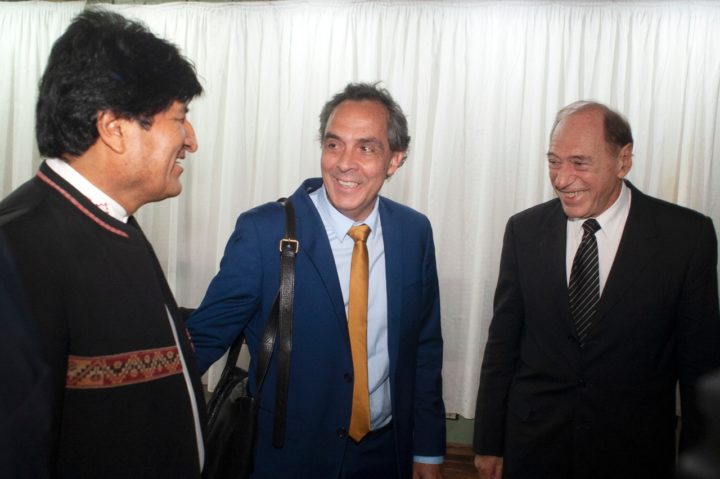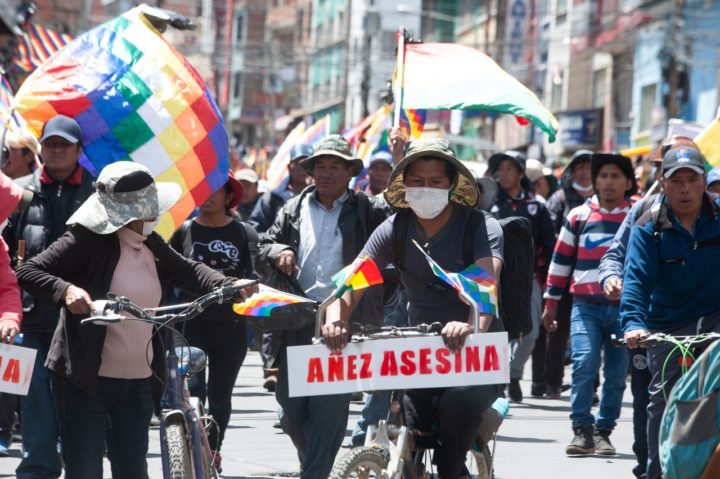On Monday, June 6, the Bolivian prosecution charged and asked for the arrest of former President Evo Morales for “Terrorism and sedition.” The case based on a home audio attributed to the former president was reactivated in this way, who supposedly from Mexico where he was a refugee, instructed the coca grower leader Faustino Yutra to block roads and prevent food from entering different cities in the context of the conflicts. Unleashed in November 2019, the outcome of which was a coup d’état.
The investigation had begun on November 20, 2019 after the de facto government filed the charges against the former president for “terrorism, sedition and terrorist financing.”. On December 20, prosecutors requested the arrest of Morales, who was in Argentina with “refugee status,” for which the Argentine authorities refused to extradite him.
Interpol has South American regional headquarters in Buenos Aires, a red alert request is expected to be sent to create a diplomatic conflict with Argentina, whose president Alberto Fernández does not recognize Jeanine Áñez as constitutional and legitimate president of the Plurinational State of Bolivia, because he did not agree to power by democratic vote. She proclaimed herself president of Bolivia in a semi-empty legislative assembly and the presidential band was put on by a military man. On the outside, the legislative assembly was besieged by the military, surrounded by tanks and helicopters. The self-proclamation came after the resignation of former President Morales at the request of the head of the F.F.A.A.(The Armed Forces(Las Fuerzas Armadas) Williams Kaliman. Áñez to become de facto president, first proclaimed herself president of the senate, and only then president of Bolivia, before that, she was the second vice president of the senate, so she did not comply with the line of succession, since her party had obtained only 4% of the votes.
Morales’ lawyers, Raúl Zaffaroni and Gustavo Ferreyra issued a statement: “Bolivia is a rule of law where brute force rules. The imputation to Evo Morales constitutes the umpteenth evidence of the police state in Bolivia. The evidence does not exist, the prosecution is nonsense, just like the arrest request. There is no criminal charge that should incriminate the former president, our defendant. Morales fights for the recovery of the constitutional state and democracy. The weight of our reasons clears the despicable signs, such as the imputation and the request for arrest. ”

Evo Morales with his two lawyers Gustavo Ferreyra and Raúl Zaffaroni. (Photo by Rolande Andrade Stracuzzi, law 11723)
On the other hand, on June 15, the investigation that accused Evo Morales of planning a fraud in the 2019 elections was reactivated and the spontaneous presentation of a “key witness” whose statement would allow expanding the complaints and requests for capture. Salvador Romero, president of the Supreme Electoral Court who has a close friendship with Carlos Mesa, candidate for the Citizen Community, and appears in various photographs on social networks, joined this complaint.
The coup strategy is to “prove” by judges co-opted by the coup that there was fraud without evidence and to annul the legal status of the M.A.S. (Movimiento Al Socialosmo/Movement to Socialism)It would be an option for the coup plotters that would allow them to win an election, remove the M.A.S.
The political and judicial persecution against the former president does not end there, on June 25 Arturo Murillo, de facto government minister, absurdly accused Morales of being the ideologue of the scandalous cause of corruption for the purchase of surcharged respirators in which he detained former coup minister Marcelo Navajas health. Murillo maintained that this cause responds to “a conspiracy of the M.A.S.” and expanded the complaints to the coca grower leader Andrónico Rodríguez, and to two former ministers, among 10 other people, for alleged crimes of illicit enrichment affecting the state and criminal organization. In this case, a “key witness” would also have been presented, who would provide data that commits the leaders and former officials of the M.A.S.
Ban of the candidate for president, Luis Arce
On June 30, the criminal complaint filed by Sergio Flores became known. Manager of the public pension fund manager against Luis Arce Catacora, candidate for president of the Movement for Socialism for the purchase of two computer programs when he was president of the board of directors of the public fund manager, which would have caused economic damage to the detriment of the state. The complaint was made two months after the presidential elections set for September 6 in the country and in the context in which Áñez announces decree 4,272 to reactivate employment. The M.A.S denounced that said decree implies a return to neoliberalism, favoring private companies and excluding public companies from resorting to funds from the national treasury, condemning them to bankruptcy for their subsequent privatization. In this way, the existence of the Juancito Pinto and Juana Azurduy bonds is put at risk, whose payment fund comes from the income of public companies. Furthermore, this decree determines the privatization of basic services: electricity, water, gas, etc., which were declared as a human right by Morales, who lowered his prices in the country.
Justice Minister Álvaro Coimbra confirmed that they will accept the complaint against Luis Arce and asked the prosecution to reactivate the proceedings to cite him in the case of the embezzlement of the development fund for indigenous indigenous peoples and peasant communities (FONDIOC), in which they would be Most of the former officials of the government of former President Morales are involved. Luis Arce is accused of breach of duties and others. Coimbra also reported that the more than 60 processes for alleged corruption will be reactivated during the Morales government.

Luis Arce during a meeting with the Argentinean President, Alberto Fernández. (Photo: Télam)
Judicial persecution or lawfare is a well-known strategy in the region, to which various former leaders such as Lula Da Silva, Rafael Correa and Cristina Fernández de Kirchner have been subjected, to try to remove them from electoral competition before the overwhelming support of their peoples. The Brazilian case was paradigmatic.
On June 30 from the national address of the M.A.S.-I.P.S.P. A statement was issued at the national and international level denouncing the attempt to disqualify the candidate for the presidency Luis Arce by the M.A.S. that is presented as the undisputed winner in the polls in order to prevent participation in the elections on September 6. In such a way, the M.A.S. Bolivia’s main political force, through a judicial coup. You bet to compete in an election but without the main competitor.
Luis Arce arrived in La Paz, from exile in Mexico to start his proselytizing campaign on January 28 last, he was immediately notified by the prosecution for a corruption case as soon as he got off the plane in a hallway at the El Alto airport. He is accused of alleged breach of duties in the case of the indigenous fund (F.O.N.D.I.O.C.), when he was minister of economy. This case is the one that the coup plotters warned will reactivate immediately. Previously, Luis Arce was also in custody at the Mexican embassy in La Paz after the coup d’etat on November 10, 2019, and was asylum in Mexico after obtaining a de facto government pass.
Elections in Bolivia are set for September 6, and all the polls give the candidate Luis Arce of the Movement for Socialism as the winner. The context is of political, economic, social and health crisis in the country with a strong coup offensive towards the Bolivian people to avoid the next elections at all costs, despite the establishment of the electoral date. The coup attempt seeks to avoid the elections with violent actions to convulse the country and at the same time the pandemic is sinisterly administered in order to obtain a peak of contagions of 130 thousand contagions by the electoral date. For this reason, Áñez did not take the necessary containment measures and only after the collapse of the health system did tests begin to justify the shooting in the official figures. Another option would be to carry out the elections, but eliminating the main opposition candidate from the competition and / or annulling the legal status of the M.A.S.
The assumption of a purely military government that would eliminate the holding of elections on the established date is also noted. This situation is intertwined and reconfigured in relation to the regional and international geopolitical context in which the United States ceased to be the economic power of the world and the chief Trump of Áñez, also falls sharply in the polls for his re-election, which shows that the pandemic can lead to various governments.
Translated from Spanish by Lultih Van










